#miracle on the vistula
Text
youtube
Today, August 15th, is the anniversary of the 1920 Battle of Warsaw during the Polish-Bolshevik War in which Poland defeated Russia.
The war featured overconfident and squabbling Russian invaders, determined Polish defenders, jamming of a military communications system, a counteroffensive against the invaders, and Westerners surprised at Poland's success. Sound a bit familiar? 🤔
Because people outside Eastern Europe usually know little about Eastern European history, it's worth reminding everybody that Russia has been stopped by smaller neighbors in the past.
The Battle of Warsaw became known as the Miracle on the Vistula (Cud nad Wisłą).
Russia has been trying to undermine and neutralize Poland one way or another for about 250 years. Just today I saw this news story at Meduza.
'We are here': Two Russian nationals detained in Poland after allegedly hanging Wagner recruitment posters around Krakow and Warsaw
At the best of times, Poland is suspicious of Russia – and with good reason. Joining NATO on 19 March 1999 was a great relief for Poland.
The Polish attitude towards Russia could be summed up by this joke which may have been inspired by the September, 1939 invasions of Poland from the west by Nazi Germany and from the east by Soviet Russia.
A Polish soldier is being charged by a Russian and a German. Who does he shoot first, and why?
The German, because business before pleasure.
🇵🇱🇺🇦
#bitwa warszawska#polska#battle of warsaw#miracle on the vistula#cud nad wisłą#poland#russia#ukraine#invasion of ukraine#eastern europe#nato#polish-bolshevik war#wojna polsko-bolszewicka#польсько-більшовицька війна#польща#загарбницька війна росії#путин хуйло#слава україні!#героям слава!#Youtube
11 notes
·
View notes
Link
In late 2022, a report on Belarus’s state-funded media singled out the mural in the Soly church, accusing it of “inciting national and religious hatred.” The report also claimed priests of the church “do not care about saving souls, but about returning western Belarus to Poland.”
The painting had reportedly previously been covered up by Soviet authorities, then was revealed and re-sanctified after the fall of the U.S.S.R.
#Belarus#Roman Catholic churches#Polish cultural heritage in Belarus#history#U.S.S.R.#murals#art#Belarus–Poland relations#Miracle on the Vistula#Polish-Soviet War
1 note
·
View note
Text
"...On the morning of Aug. 15, the Feast of the Assumption, wave upon wave of Soviet soldiers continued to attack Warsaw. Yet that morning, from within the city, Polish forces managed somehow to stem their advance. And then, against all odds, they began to retake ground that the Red Army had won. The Soviets started to wonder how the Polish army, which they had seen defeated for many weeks, had begun to fight back with fresh heart against a superior foe. A Soviet counterattack ensued, but it was futile. The Red Army was unable to vanquish the defending Poles. In fact, as the day of Aug. 15 progressed, Polish soldiers seemed to become bolder in counterattack. Strange rumors began to circulate in Warsaw. Some claimed that in the sky above the Polish lines had appeared the Black Madonna of Czestochowa..."
25 notes
·
View notes
Text
Battle on the outskirts of Warsaw
'Miracle on the Vistula' my ass - Józef Piłsudski, probably
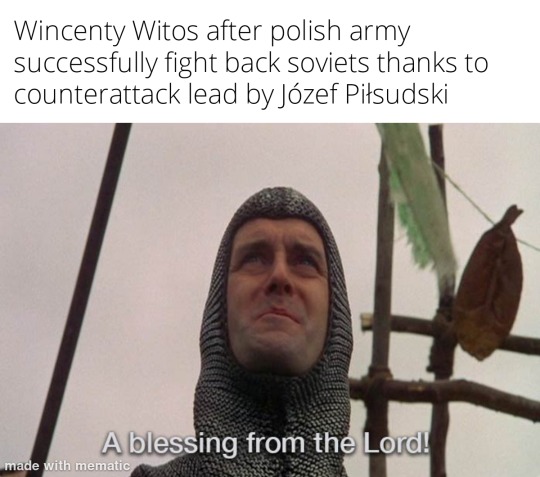
6 notes
·
View notes
Text
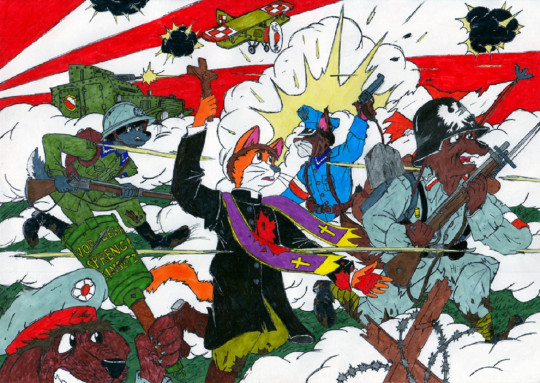
"1920: A Miracle on the Vistula river" by Pandaren_chaplain
#furaffinity finds#if I had a penny for every time I came across Polish-Soviet War furry art I'd have two pennies#Which isn't much but it's weird it happened twice
5 notes
·
View notes
Photo

Adrianna Sułek 🇵🇱
2021 Miracle on the Vistula (Warsaw)
2 notes
·
View notes
Text
instagram
90th Anniversary of Battle of Warsaw, 2010, Poland, 20 Złotych, Silver (.925) (3D pad printin), Proof, Mintage: 50.000, 28.28 g, 36.61 mm
The Battle of Warsaw (Polish: Bitwa Warszawska), also known as the Miracle on the Vistula (Polish: Cud nad Wisłą), was a series of battles that resulted in a decisive Polish victory in 1920 during the Polish–Soviet War. Poland, on the verge of total defeat, repulsed and defeated the Red Army.
After the Polish Kiev Offensive, Soviet forces launched a successful counterattack in summer 1920, forcing the Polish army to retreat westward in disarray. The Polish forces seemed on the verge of disintegration and observers predicted a decisive Soviet victory.
The Battle of Warsaw was fought from August 12–25, 1920 as Red Army forces commanded by Mikhail Tukhachevsky approached the Polish capital of Warsaw and the nearby Modlin Fortress. On August 16, Polish forces commanded by Józef Piłsudski counterattacked from the south, disrupting the enemy's offensive, forcing the Russian forces into a disorganized withdrawal eastward and behind the Neman River. Estimated Russian losses were 10,000 killed, 500 missing, 30,000 wounded, and 66,000 taken prisoner, compared with Polish losses of some 4,500 killed, 10,000 missing, and 22,000 wounded.
The defeat crippled the Red Army; Vladimir Lenin, the Bolshevik leader, called it "an enormous defeat" for his forces. In the following months, several more Polish follow-up victories secured Poland's independence and led to a peace treaty with Soviet Russia and Soviet Ukraine later that year, securing the Polish state's eastern frontiers until 1939.
#coin#coincollection#coins#coinscollection#currency#hobby#coinhunting#coinphotography#numismatica#numismatist#warsaw#battle#world war one#poland#złoty#silvercoins#silverstacking#silverstacker#silver#coincollecting#coincollector#coincollections#coincollectors#rare coins#numizmatyka#numismatique#numismatics#numismatik#numizmatyk#numismática
0 notes
Photo
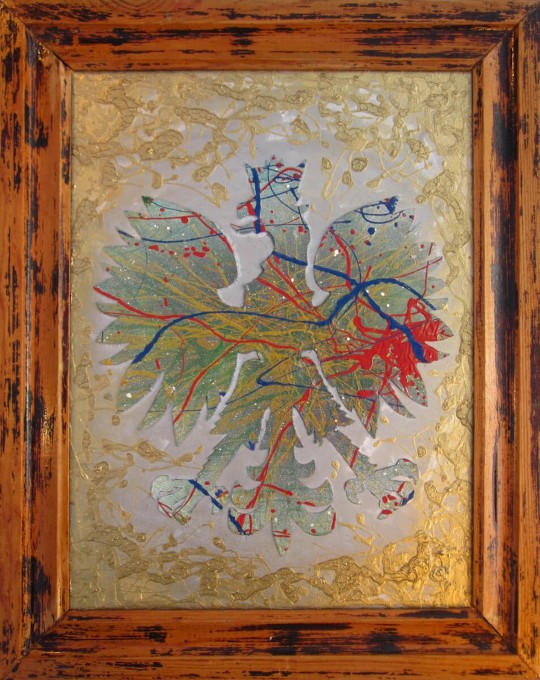
Title: Cud nad Wisłą | Miracle on the Vistula Artist: Marcin Dembowski (1979) Size: 47 x 37,5 cm | 18,5 x 14,76 inch (+ frame) Technique: mixed Surface: HDF board Signature: on the reverse Atelier: @dombesokien Year: 2013 SKU: AmiNo.1987 Stock: SOLD **** Available via dombes.pl * * * * #cudnadwisłą #miracleonthevistula #AX #dembowski #dombes #malarstwo #hobby #destiny #abstractart #art #sztuka #art_collective #art_we_inspire #artis #artysta #artistsoninstagram #artwork #beautiful #conceptart #contemporaryart #experimentalart #fanart #handmade #instaart #modernartist #myart #painting #obraz #paintingart #visualart https://instagr.am/p/CfD9MoKIGu4/
0 notes
Text

The Allegory of Victory in 1920, Zdzisław Jasiński
The Battle of Warsaw, 1920
Free people everywhere should be grateful to the Poles for the victory. - Lawrence W. Reed
Many historians consider the Polish-Soviet war (February 1919 – March 1921), and especially the Battle of Warsaw, to be a key moment in European history.
Making war on Poland was more than a local affair to the Soviets. They made it plain that the Poles were simply in the way of their larger goal: exporting communism to the rest of Western Europe. Germany, gripped by post-war economic and political chaos, seemed ripe for a Marxist revolution if only Soviet troops could move in and assist, but Poland would have to be disposed of first.
Nicknamed “the Red Napoleon,” Soviet commander Mikhail Tukhachevsky ordered, “To the West! Over the corpse of white Poland lies the road to worldwide conflagration. March upon Vilnius, Minsk, Warsaw and onward to Berlin over the corpse of Poland!” Bolshevik theoretician and Lenin confidant Nikolai Bukharin publicly declared that the campaign would take communist forces “straight to London and Paris.”
Soviet victories in the summer of 1920 looked unstoppable, as Moscow’s Red Army pushed to within striking distance of the Polish capital. From August 12-25, the Battle of Warsaw raged. Foreign observers expected the imminent collapse of Poland. Then, the tactical brilliance of Pilsudski and his chief of staff Tadeusz Rozwadowski plus the legendary courage of Polish fighters combined to produce what Poles call “the Miracle on the Vistula.”
While the central Russian armies were fixated on Warsaw, a Polish strike force side-slipped to the south of the city, and then turned north in a left hook into the exposed Russian flank. Surprised, demoralized, and outmaneuvered, the Russian armies disintegrated, with some retreating back to Russia and others fleeing to German territory to be interned. Pilsudski's counteroffensive was assisted by the breaking of Russian codes, a Polish specialty that they later used to crack the Nazi Enigma machine.
For the next two months, a string of additional Polish successes produced what Lenin lamented as “an enormous defeat” for his forces. Against all the odds, Poland had crushed the Soviet Union’s revolutionary expansionism dead in its tracks. There would be no Bolshevik Western Europe.
#poland#battle of warsaw#Miracle on the Vistula#polish soviet war#Bolshevik#russia#soviet union#red army#Tadeusz rozwadowski#Józef Piłsudski#Bitwa warszawska#cud nad Wisłą#saber#bayonet#ww1
101 notes
·
View notes
Link
#battle of warsaw#miracle on the vistula#polish-soviet war#history#europe#warsaw#poland#warszawa#polska#1920
1 note
·
View note
Text
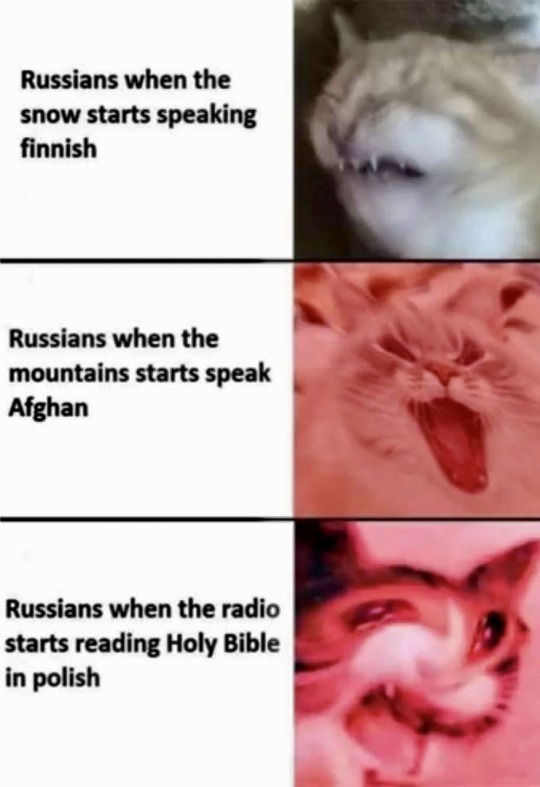
#history#funny history#history jokes#meme history#history memes#military history#miracle over the Vistula#polish-soviet war
348 notes
·
View notes
Video
youtube
The Battle of Warsaw, 1920: One Hundred Years Ago by Norman Davies
Polish Cultural Institute in London
Norman Davies, an author and historian, invites you to listen to a podcast about the Battle of Warsaw, 1920, prepared for the Relief Society for Poles and produced by UrbanRec for the Polish Culture Institute in London. The Battle of Warsaw, also known as the Miracle of the Vistula, was a series of battles that resulted in a decisive Polish victory in 1920 during the Polish–Soviet War. Poland, on the verge of total defeat, repulsed the Red Army in what Vladimir Lenin, the Bolshevik leader, called “an enormous defeat” for his forces. To mark the 100th anniversary of this remarkable event in the European history, Polish Cultural Institute produced a podcast with the extraordinary Norman Davies reflecting on the battle.
#Poland#polish–soviet war#Battle of Warsaw#communist invasion#Russian imperialism#Soviet defeat#defence of Europe#1920#independence#Warsaw#Miracle of the Vistula#European history#Europe
9 notes
·
View notes
Photo
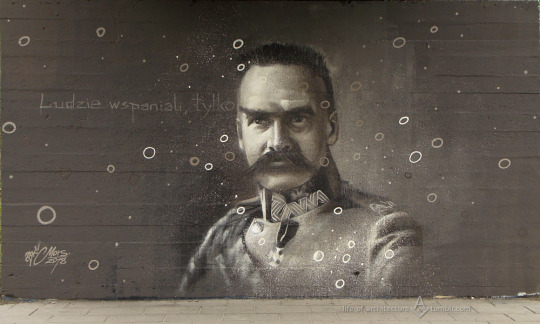
Nowy Sącz
ul. Węgierska
portret Józefa Piłsudskiego
autor: Mariusz 'Mgr Mors' Brodowski
foto z 6 lipca 2018
Dzisiaj mija setna rocznica przełomowego dnia Bitwy Warszawskiej - manewrem, który okazał się decydującym, dowodził Józef Piłsudski.
Mural parafrazuje cytat o Polsce przypisywany Piłsudskiemu: Naród wspaniały, tylko ludzie kurwy.
><><><><><><><><><><><><><><><
Nowy Sącz, Poland
Węgierska St.
portrait of Józef Piłsudski
by Mariusz 'Mgr Mors' Brodowski
taken on 6 lipca 2018
Today marks the 100th anniversary of the crucial day of the Battle of Warsaw; Józef Piłsudski lead the counterattack that was the turning point.
Ludzie wspaniali, tylko... (The people are great, just...) is a paraphrase of a quote referring to Poland, ascribed to Piłsudski: A great nation, just the people are cunts.
Disclaimer: I am not the author of the art itself; I own only the photo.
#street art#urban art#photographers on tumblr#original photography#murals#Europe#Poland#Polska#Nowy Sącz#Nowy Sacz#portraits#historical figures#historical facts#battles#military history#Cud nad Wisłą#Miracle of the Vistula#Polish-Soviet War#quotes#anniversaries
0 notes
Note
Hi kisscookin, idk what to call you is it alright to call you that? I'm the one who ask you about totalitarian socialism thing btw... so you don't approve it? How abt China right now? They're also kinda.. have the same thing don't you think?
And btw.. I'm not Chinese so don't worry to answer my question if you don't approve it, or if you approve it.. I just want to know what people think abt them..
You can reply in private if you want...
Sorry if I seem to be too obtrusive.. I just.. want someone to talk about deeper things.. like.. my friends are kinda don't really know or don't care abt looking things behind the veil of what usually are known by general masses.. so.. I really want to discuss smt with like minded people..
And also.. I want to be your friend and talk about things.. if you don't mind cause I think you seem to be a nice and well informed person.. hmm. Thankyou.., I hope I hear from you soon! Take care! 💕💕 🍀
hi lovely ♡ actually I'm very happy that you asked me those questions! politics, history and international issues are my cup of tea! I love talking about it and giving everyone random lectures like I'm professor lol (one day I will hehe)
yes, I don't approve totalitarian systems. with authoritative systems.... I don't know, I would argue. but nevertheless I'm big "fan" of democracy.
don't worry, most of my friends also are not interested in such topics. if you want to chat with me more about issues that bother you or interest you, hit me up in DMs!
I've read bunch of books about China, Asian history in XX century, communists, totalitarian systems, especially USSR and Third Reich. also I passed my uni exams with the best grades so I think I possess enough knowledge to answer your question haha 😊
First of all, China is specific and unique in every meaning of this word. even communism there is... not really communism. to discuss China political system, we have to turn back time to overthrowing Qing dynasty, if I'm not wrong. that overthrowing happened in approx. 1920's — at the peak of the bolshevic revolution. bolshevic wanted to take world so badly and expand their sick ideology to every country. they didn't make it on the West side, because Poland stopped them in 1920 — that even is called The Warsaw Battle or The Miracle over the Vistula River in rough translation. the bolshevic started to mix and stir things up on the East side. they started to introduce their ideology step by step in China. that intensified when Joseph Stalin came to power. let's end the thread regarding USSR.
years later, in Chinese revolution (that lasted till 1945), there were two opposing sides. Kuo MinTang (called shortly KMT) and Mao Zedong's partisan army. Mao knew very well that China is indeed super unique country. he deducted that in order to take over China and introduce communism, he has to modify 'original' ideology that was based on Marx and Engels ideas. (btw Marx never worked as worker in factory! Engels was giving money to him and his family lol but Marx still managed to write 1000 pages book about working class. apparently very boring). because at that time China was rather poor, agricultural country, it was impossible to conduct revolution of the prolet. almost no factories as that time. he gained support and power through farmers, peasants, ex soldiers, killers, bandits. the most frustrated and furious group of Chinese people at that time. in big mental shortcut that's how he and his 'staff' came into power. of course KMT lost the battle of China, but its different story.
generally there were some similarities and differences between China People's Republic and rest of communist world back in the day. but differences started appearing more after Mao Zedong's death.
nowadays I would say that China is more authoritative country rather that totalitarian. I know they label themselves as communist country, and there's still only one ruling party, but look at the market — capitalism! stock markets, private property, private businesses, international trade, international investments, etc. everything that I've mentioned defines capitalism! but with the mix of communist party, propaganda, censorship it creates new political system — Chinese system lol but seriously that specific and differential country have to produce specific system, in order to make it work.
even though I 'admire its own uniqueness through diplomat's eyes, its still inhuman political system. free speech right is not followed, Uygur death camps, censorship, inhuman work conditions, air pollution, random rockets in space and more and more.....
I will never approve inhuman, oppressive system, but regarding of Chinese political situation, I don't think it will change in like 50 years. what should happen in order to overthrow ruling party? kinda impossible I guess.....
let me know what you think. feel free to comment I'm curious.
6 notes
·
View notes
Photo
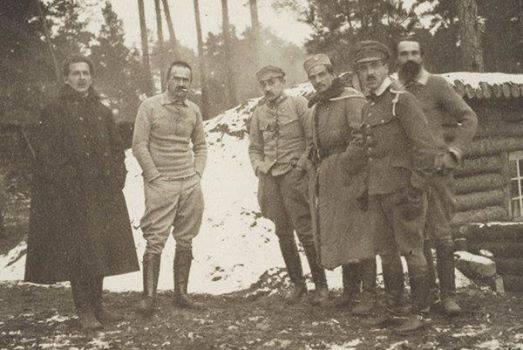
My favourite photo of Józef Piłsudski (second from left) and his crew. Piłsudski was a leader of Poland during the interwar period and one of the biggest badasses known to history.
Read here: How Józef Piłsudski and Poland saved Europe from a Soviet invasion in 1920.
1 note
·
View note
Note
What’s some unrealistic military success in historical times that happened? Like the Alexander the Great goat tracks.
Well, we need to watch about things like that. Plenty of times these unreasonable feats come from heroic mythmaking that took place over the centuries. This is particularly true the further back you go where evidence becomes incredibly hard to find thanks to the natural progression of time.
Plenty of crazy unlikely victories in history though. On land you have everything from the Battle of Alesia to the Battle of Okehazama to the Miracle at the Vistula. At sea you have “Divine Salamis” to the Battle of Myeongyang all the way up to the Battle off Samar for incredible naval mismatches. Most every country in history has an amazing, come-out-of-almost-nowhere victory (which in reality is due to a combination of skill, leadership, and luck) that they rightly celebrate within their military history.
Thanks for the question, Anon.
SomethingLikeALawyer, Hand of the King
13 notes
·
View notes